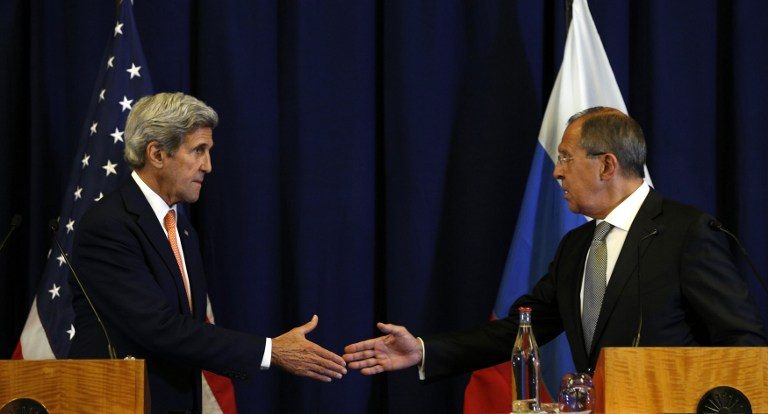SUMMARY
This is AI generated summarization, which may have errors. For context, always refer to the full article.

BEIRUT, Lebanon – The Syrian opposition on Saturday, September 10, cautiously welcomed a ceasefire deal agreed by Moscow and Washington that could also see the first joint military campaign by the two powers against jihadists.
US Secretary of State John Kerry and Russian Foreign Minister Sergei Lavrov said that the truce, reached in Geneva late Friday, would come into force on Monday, the first day of the Muslim holiday of Eid al-Adha.
The two powers back opposing sides in the conflict, with Moscow supporting the regime of President Bashar al-Assad and Washington backing a coalition of rebels it regards as moderate.
But if Russia is able to persuade Assad to respect the ceasefire for a week, Moscow and Washington will set up a joint coordination unit to bomb agreed “terrorist” targets.
A leading member of the High Negotiations Committee said the opposition umbrella group cautiously welcomed the agreement.
“We welcome the deal if it is going to be enforced,” said Bassma Kodmani.
“We are waiting for Russia to persuade the regime that is necessary to commit to this agreement,” she added.
The much anticipated – if tentative – breakthrough came after marathon talks between Lavrov and Kerry in Geneva, as the pair push for an end to the five-year war that has killed 290,000.
Decision time for rebels
Both Kerry and Lavrov said the complex plan is the best available chance to end fighting between the regime and mainstream rebels while still targeting jihadists from former Al-Qaeda affiliate Al-Nusra Front and the Islamic State group.
“Today, the United States and Russia are announcing a plan which we hope will reduce violence, ease suffering and resume movement towards a negotiated peace and a political transition in Syria,” Kerry said.
Lavrov said the US and Russia agreed on zones in which joint “strikes against terrorists” would be conducted.
The vexed question of Assad’s fate remains, with Western powers calling for his ouster and Russia backing him.
Key to the deal is the delivery of desperately needed aid to civilians in rebel-held areas of Syria’s second city Aleppo which are under siege by government forces.
Russia also needs to persuade the Syrian air force to stop strikes on rebel-held areas, which have killed large numbers of civilians.
In turn, Washington must get opposition groups it backs to separate themselves from the former Al-Nusra, now called Fateh al-Sham Front, which has allied itself with a range of rebels at different points in the fluid conflict.
Kodmani said the rebels would break ranks with the jihadists if the truce deal held.
“The moderate groups will reorganise and distance themselves from the radical groups. We will do our part,” she said.
Charles Lister of the Middle East Institute said mainstream rebels view the US-Russia talks with extreme distrust and seem reluctant to disassociate themselves from the powerful jihadists in case the ceasefire fails.
Rebels now face the “biggest and most momentous decision since they chose to take up arms against the Assad regime in 2011,” he said.
‘Window of opportunity’
Only if commitments by Moscow and the Assad regime to cease violence for 7 days are “fully met” will the US and Russia start cooperating with joint strikes, the Pentagon said.
Lavrov said the Syrian government was “ready to fulfil” the agreement, but that Moscow could not “100 percent guarantee” all parties would respect the ceasefire.
A UN-backed truce agreed in February has been repeatedly broken by both sides.
The final hours of the talks dragged out as Kerry contacted the White House to get approval for the plan, but the top diplomat said both governments stand by it.
Kerry said the US was “going the extra mile here because we believe that Russia and my colleague have the capability to press the Assad regime to stop this conflict and come to the table and make peace.”
British Foreign Minister Boris Johnson welcomed the deal but said it was “vital that the regime in Damascus now delivers on its obligations.”
Key rebel backer Turkey also backed the deal, adding that it was essential that the fighting stop and aid start flowing from day one of the ceasefire.
UN Syria envoy Staffan de Mistura said that the deal provided a “window of opportunity” and that he would begin consultations on a relaunch of peace talks.
German Foreign Minister Frank-Walter Steinmeier said, “Everything now depends on rapid implementation.”
The truce deal follows heavy fighting around Aleppo in recent weeks in which the rebels fought unsuccessfully to break the government siege. – Rappler.com
Add a comment
How does this make you feel?
There are no comments yet. Add your comment to start the conversation.